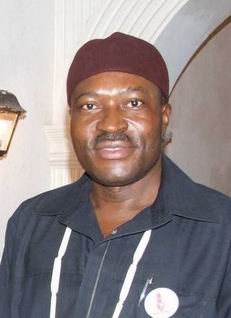This article needs additional citations for verification .(February 2022) |
This is a list of Nigerian films released in the 1980s .
This article needs additional citations for verification .(February 2022) |
This is a list of Nigerian films released in the 1980s .
| Title | Director | Genre | Notes | Ref | ||
|---|---|---|---|---|---|---|
| 1980 | ||||||
| Jaiyesinmi | Frederic Goode | Drama | [1] [2] | |||
| Kadara | Ade-Love | Drama | ||||
| 1981 | ||||||
| Rise and Fall of Idi Amin | Sharad Patel | Biography, Drama | British-Kenyan-Nigerian co-production | |||
| Cry Freedom | Ola Balogun | Drama | [2] | |||
| Efunsetan Aniwura | Bankole Bello | |||||
| 1982 | ||||||
| Orun Mooru | Ola Balogun | Drama | Shot on 35mm, but was reduced to 16mm for distribution and exhibition | |||
| Aropin N'Tenia | Frederic Goode | [1] | ||||
| Anikura | Oyewole Olowomojuore | |||||
| 1983 | ||||||
| Money Power | Ola Balogun | |||||
| Taxi Driver | Ade-Love | Drama | ||||
| Evil Encounter | Jimi Odumosu | Horror | First Nigerian film released directly on television | [3] [4] | ||
| Aare Agbaye | Moses Olaya Adejumo Oyewole Olowomojuore | |||||
| 1984 | ||||||
| Papa Ajasco | Wale Adenuga | Drama | Described as the first blockbuster in Nigeria, grossing approximately ₦61,000 in three days | [5] | ||
| Vengeance of the Cult | Eddie Ugbomah | |||||
| 1985 | ||||||
| Witchdoctor of the Livingdead | Charles Abi Enonchong | Horror | ||||
| Mosebolatan | Moses Olaiya | Described as the film grossed ₦107,000 in five days | [1] [5] | |||
| Kannakanna | Bayo Aderohunmu | |||||
| 1986 | ||||||
| Apalara | Eddie Ugbomah | |||||
| 1987 | ||||||
| Things Fall Apart | David Orere | Drama | Based on the 1958's novel by Chinua Achebe | [2] | ||
| Taxi Driver 2 | Ade-Love | Drama | ||||
| 1988 | ||||||
| Vigilante | Adedeji Adesanya | Action | ||||
| Soso Meji | Ade Ajiboye | First Nigerian film released on video | ||||
| Ayanmo | Hubert Ogunde | Drama | [1] | |||
| 1989 | ||||||
| Koto Orun | Alhaji Yekini Ajileye | History, Drama, Family | Made in Yoruba language | |||
| The Great Attempt | Eddie Ugbomah | [2] | ||||
| Ekun | Alade Aromire | |||||

The cinema of Nigeria, often referred to informally as Nollywood, consists of films produced in Nigeria; its history dates back to as early as the late 19th century and into the colonial era in the early 20th century. The history and development of the Nigerian motion picture industry is sometimes generally classified in four main eras: the Colonial era, Golden Age era, Video film era and the emerging New Nigerian cinema era.

Genevieve Nnaji is a Nigerian actress, producer, and director. She won the Africa Movie Academy Award for Best Actress in a Leading Role in 2005, making her the first actor to win the award. In 2011, she was honoured as a Member of the Order of the Federal Republic by the Nigerian government for her contributions to Nollywood. Her directorial debut movie, Lionheart, is the first Netflix film from Nigeria and the first Nigerian submission for the Oscars. The movie was disqualified for having most of its dialogue in English. After having spent decades in the movie industry, she was profiled alongside some celebrities and business executives in 2020 in two new books by publisher and Editor in Chief of Yes International! magazine, Azuh Arinze.

Anayo Modestus Onyekwere popularly known as Kanayo O. Kanayo is a Nigerian actor and lawyer. In 2006, he won the Africa Movie Academy Award for Best Actor in a Leading Role for his performance in the movie Family Battle.

Majid Michel is a Ghanaian actor, model, television personality, evangelist and a humanitarian. He received nominations for Best Actor in a Leading Role at the Africa Movie Academy Awards in 2009, 2010, 2011, 2012, 2014 and 2017. He eventually won the award in 2012 after three previous consecutive nominations. Majid Michel attended Mfantsipim School, along with fellow actor Van Vicker.

The Africa Movie Academy Awards, popularly known as AMAA and The AMA Awards, is presented annually to recognize excellence among professionals working in, or non-African professionals who have contributed to, the African film industry. It was founded by Peace Anyiam-Osigwe and is run through the Africa Film Academy. The awards are aimed at honouring and promoting excellence in the African movie industry as well as uniting the African continent through arts and culture. The award presentation is attended by numerous media representatives, celebrities, politicians, journalists, actresses and actors from all across the world. The AMA Awards is widely considered to be Africa's most important film event and the most prestigious film award in Africa.
The 3rd Africa Movie Academy Awards ceremony was held on March 10, 2007 at the Gloryland Cultural Center in Yenagoa, Bayelsa State, Nigeria, to honor the best African films of 2006. The ceremony was broadcast live on Nigerian national television. Numerous African & international celebrities and top Nigerian politicians attended the event, including Nigerian musician Tuface Idibia and Ghanaian hiplife band VIP. Nollywood actor Richard Mofe-Damijo and South African actress Thami Ngubeni hosted the ceremony. Special guests of honor were Academy Award winners Cuba Gooding, Jr. and Mo'Nique. Nollywood's favourite acting duo Osita Iheme and Chinedu Ikedieze received the Lifetime Achievement Award.

Kunle Afolayan is a Nigerian actor, producer and director. He is widely credited for elevating the quality of Nollywood movies through larger budgets, shooting on 35mm, releasing in cinemas, and improving cliché Nollywood storylines. After starting his film career as an actor in the 1999 political drama Saworoide, Afolayan made his directorial debut in 2006 with Irapada, a Nigerian supernatural thriller, which won the Africa Movie Academy Award for Best Film in an African Language. His follow-on directing credits include The Figurine, Phone Swap, October 1, and Citation. October 1 was the winner of 16 major African movie awards in 2015 and the second highest grossing Nigerian film in Nigerian cinemas at the time of its release, a feat Afolayan was to repeat two years later with The CEO. In 2021, the director signed a three-picture deal with Netflix. Swallow, the screen adaption of Sefi Atta's book of the same name was the first to be released in October 2021, followed by Aníkúlápó, an epic Nigerian fantasy released in September 2022. Afolayan has described the work as a "Game of Thrones recreated in Nigeria but with a better representation of our culture”. Eleven days after its release, it was the #1 most-watched non-English Netflix original film.
Judith Emike Audu-Foght, professionally known as Judith Audu, is a Nigerian film and television producer, director, casting director, actress, presenter, model and blogger. She is widely known for her movie production credits which include Just Not Married, The Family and The Sessions. In 2019, she was listed among the YNAIJA 100 most Influential Nigerians in Film.

Beverly Naya (born Beverly Ifunaya Bassey; 17 April is a British-born Nigerian actress. Beverly won Most Promising Talent at the 2010 Best of Nollywood Awards. She also won the award for Fast Rising Actress at the 2011 City People Entertainment Awards.
Samuel Dedetoku, popularly known by his stage name Sam Dede, is a Nigerian veteran actor, director, politician and lecturer. Sam Dede as he is widely known in movies studied Theatre Arts at the University of Port Harcourt.

Amaka Igwe was a Nigerian filmmaker and broadcasting executive. Igwe was the owner of Top Radio 90.9 Lagos and Amaka Igwe Studios. She was recognized as one of the second-generation filmmakers who helped begin the video film era of Nigerian cinema. She remained a prominent figure in the industry until her death in 2014 resulting from an asthma attack.

Golden Age or Golden era are terms used in Nigerian film history to designate the motion picture industry of Nigeria from the late 1950s to the late 1980s. It captures the mode of visual and sound production, as well as the method of distribution employed during this period. This period began with the formal recognition of the Nigerian Film Unit as a sector in 1954, with the first film entirely copyrighted to this unit being Fincho (1957) by Sam Zebba.

The video film era, also known as the home video era, is a period in Nigerian cinema, typically from the late 1980s / early 1990s to mid 2010s, when Nigerian films were made using affordable video format. The video boom era emerged after the downturn of the Golden era of the Nigerian cinema in the late 1980s. The term "home video" stems from the concept of staying at home to watch the films, in contrast to films of the Golden Age which were watched at the movie theatres.

New Nigerian Cinema or New Nigerian Cinema era is an emerging phase in Nigerian cinema, in which there became a major shift in the method of film production, from the video format, which came about during the video boom, back to the cinema method, which constituted the films produced in the Golden era of Nigerian cinema history. The films in the New Wave are specifically characterized by improved narrative complexity, aesthetic nuance, much higher budgets and advanced overall production values, when compared to video films from the second generation of filmmakers. They are mostly released theatrically, although some are still released directly on DVD.

Nollywood, a portmanteau of Nigeria and Hollywood, is a sobriquet that originally referred to the Nigerian film industry. The origin of the term dates back to the early 2000s, traced to an article in The New York Times. Due to the history of evolving meanings and contexts, there is no clear or agreed-upon definition for the term, which has made it a subject of several controversies.

Tope Oshin is a Nigerian television and film director, producer and casting director, listed as one of the most influential Nigerians in film in 2019. In 2015 Pulse magazine named her as one of "9 Nigerian female movie directors you should know" in the Nollywood film industry. and in March 2018, in commemoration of the Women's History Month, Tope was celebrated by OkayAfrica as one of the Okay100 Women. The interactive campaign celebrates extraordinary women from Africa and the diaspora making waves across a wide array of industries, while driving positive impact in their communities and the world at large.

Emem Isong is a Nigerian screenwriter, film producer, and film director. She has become known primarily for films in the English language, and is a dominant figure in the Nollywood industry. Her second directed feature, Code of Silence, which deals with rape in Nigeria, was released in 2015.